Ladies First: Interview with Filmmaker Tonie Marshall
Firebrand filmmaker Tonie Marshall’s feminist drama Number One is causing quite the stir – not least because of its measured depiction of women in power. France’s first (and only) award-winning female director tells Marion Sauvebois it was high time to shake up the status quo
As the first – and only – female filmmaker to win the coveted Best Director gong at France’s César Awards, Tonie Marshall knows a thing or two about crashing through the glass ceiling. In her corporate drama Number One, starring art house favourite Emmanuelle Devos, the dauntless réalisatrice tackles gender-politics head-on, charting a brilliant executive’s bid to claw her way to the top in the face of rampant sexism and endemic machismo and become the first female CEO of a major French company.
Where did the idea for Number One come from?
I had this idea back in 2009 for a series about a network of influential women, Le Club, following eight characters working in industry, politics, media, sport and their ambitions and confrontations with men. Not a single TV channel showed any interest. So I put it on the back burner but kept thinking about it.
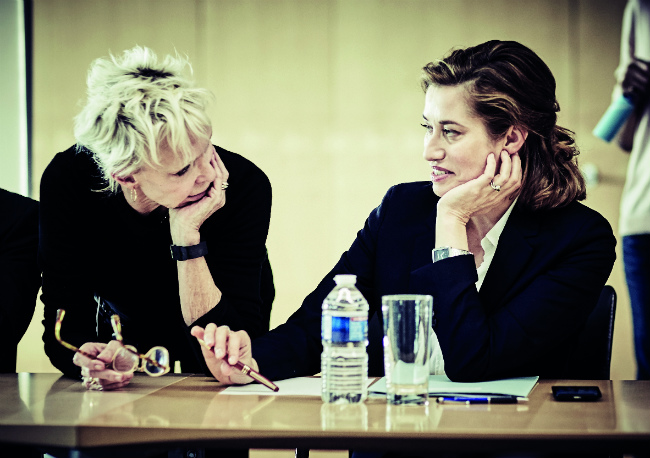
Tonie Marshall and Emmanuelle Devos on set
And you eventually came back to it…
I think it’s an interesting time for women. In many ways we’re progressing – there’s greater parity in politics – and in many others our society is regressing. There is this insidious mixture of morality, religion and gender ‘reassignation’ that is trying to put women back in their place. And where is their place? At home looking after children and keeping quiet. It’s something that doesn’t sit well with me. I think we need a lot more women to be in positions of power, as leaders. So I picked up the idea again and decided to turn it into a film, reduce the number of characters and focus on just one woman, Emmanuelle Blachey [played by Emmanuelle Devos] working in industry, and build a story around her.
Is Emmanuelle Blachey based on a real-life businesswoman?
A lot of people think Emmanuelle is based on Isabelle Kocher [the chief executive of French energy group Engie] but I actually never met her. There was an article in Le Monde recently about her and how she tried to be CEO but people conspired against her to stop it… I mean, compared to this plotting, my movie is pure Disney. I’m really soft compared to the violence you see in these male-dominated environments.
I actually tried to meet her but she never agreed. I think it was very difficult for her to be part of a project that set out to show that things aren’t so simple for women. Though, I think she’s changed her mind since. Raphaëlle Bacqué, the journalist who collaborated with me on the screenplay, helped me with my research and enabled me to meet around ten women occupying high positions in major companies.
Their anecdotes and testimony gave me a lot of material and everything in the film is based on fact. It’s happened to these women. Although I was careful not to be too specific. I also made sure Emmanuelle Devos met these women to understand the office dynamics, see how they dressed, get a feel for their mannerisms. The only thing that is not so realistic is the power wielded by the women’s network in the film.
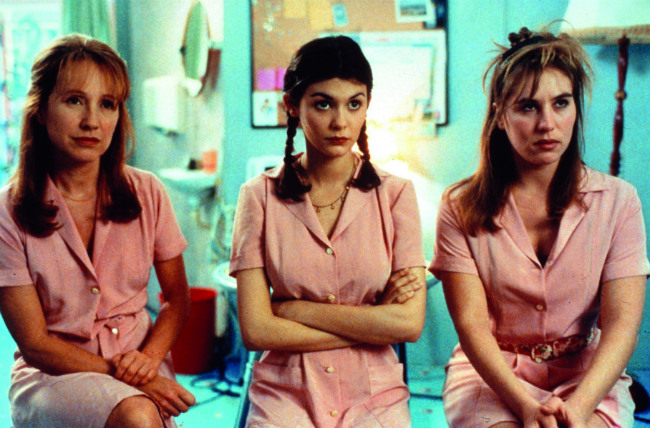
Marshall won Best Director, Best Film and Best Screenplay at the César Awards for her 1999 movie “Venus Beauty Institute”
Has anything in particular stood out from your conversations with these high-powered executives?
One thing that I wasn’t really able to include in the film but that’s stayed with me is that they told me: “We had friends, they were brilliant, they kept climbing up the ladder, to number four, number three and even sometimes number two. And then they stopped, they said, ‘No, not number one, I can’t, I don’t want my life to become a living hell’.” They knew they weren’t welcome. The race to the top is always complex but even more so when you’re a woman. What I discovered after making the film that profoundly shocked me is that women are often – but not always – overcome with self-doubt and question their ability to do their job even though they have no reason to. And yet there are men without their skills or qualifications who just click their fingers, say “I want it, I want it”, and get ahead.
Considering the premise, it is a surprisingly gentle and measured film. Far from a re-breathing dragon ruthlessly blazing a path to the top, Emmanuelle is quietly ambitious, kind and just rolls with the punches. Were you keen to subvert expectations?
There is this idea that women at the top are ‘killers’. But my premise in the film is that if women occupied decision-making positions in significant numbers, if they didn’t need to fight their way to the top, there would be fewer killers. That’s why Emmanuelle is not a killer. I was speaking to female journalists when the movie came out and, when I said it was important to have more women at the top, they said: “Oh yes, like Thatcher!”. Can you imagine? It’s as though I’d mentioned men in power and they’d said: “Oh yes, Hitler!”. Enough already…
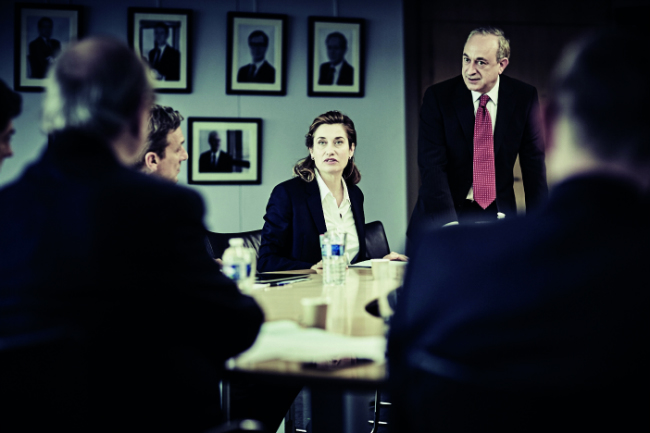
In “Number One,” Emmanuelle Blachey, played by art house star Emmanuelle Devos, must claw her way to the top despite overt machismo, sexism and misogyny. Photo: Tabo Tabo Films
Was steering clear of caricature and avoiding clichés challenging?
I tried to stay as true as possible to what I saw. I saw men just like Emmanuelle’s boss in the film. A man who is really nice to her and who doesn’t realise he’s a misogynist. I call it “benevolent misogyny”. He doesn’t even realise he’s being condescending. Instead of introducing her as Mrs Blachey, he always calls her by her first name, or refers to her as “our little mascot” and he doesn’t think twice about it; it’s just natural, enshrined in the system. I don’t turn this man into a pig in the film, I just show things as they are. I show a man who says to her: “Oh my sweet girl, if you continue to amaze us maybe one day you’ll get to number four”. He doesn’t have that same patronising relationship with his male employees.
Is this rampant machismo something you’ve been on the receiving end of as a female director?
I was very lucky when I started as a director. I was completely self-taught but I met a producer who liked my first screenplay and who trusted me. The film was a flop but that’s another story… But I did have some problems with machismo on set, silly things that I didn’t anticipate because I hadn’t really experienced anything like it before in my life. I had had quite easy and straightforward relationships with men.

Emmanuelle Devos in “Number One.” Photo credit: Tabo Tabo Films
The chief cameraman took over and because I was a novice I didn’t quite realise what was happening. I probably wasn’t feeling confident, legitimate or self-assured enough to say: “OK, you’ve fiddled with the lighting enough, now let’s start shooting.” And when I worked on Venus Beauty Institute, which was all about women working in a beauty salon, I did hear sexist remarks: “What’s that story about old bags?” When I tried to get the series about the women’s network picked up I got the same reaction; that it was too niche, that no-one would be interested. As soon as you start portraying a female collective or tackle truly ‘feminine’ subjects, you can get this sort of dismissive reaction.
And yet Venus Beauty Institute was a resounding success.
Well, it took four years to get it made. No-one wanted it. I had cast Nathalie Baye whose career at the time was at a standstill. But I refused to drop her. The film was set at Christmas so we absolutely had to have shots of Paris decked in Christmas decorations and shop windows. The co-producer and I put in 50,000 Francs of our money each and for two days we filmed her walking around Paris – she did it for free. We thought, if the film doesn’t get made we’ll throw the footage away. And at the eleventh hour we managed to make the film on very little money.
You were vindicated in the end. The film won four César Awards including Best Director and Best Film in 2000. In fact, you’re still the only woman in the history of the César Awards to receive the Best Director gong.
I know, I know… It was a clean sweep to start the new millennium: Best Film, Best Director, Best Screenplay… I got the jackpot. Success felt good considering so many people had spat on this film for so long. You think: “I wasn’t crazy, there was something there.” Sometimes when I try to make a film and things get tough, I tell myself: “Remember you aren’t mad. Maybe people will see something in it too.” Or maybe they won’t. It’s a lottery. But being the only woman to get Best Director can be embarrassing when you think of the talent out there. There are so many great female directors in France. Yes, I have the César but look at them, they’re so good. They deserve a César four times more than I do. You need to be realistic. It’s wonderful to get an award but then you get back to work, and back to square one. There are more and more women in cinema; women who reclaim what was once seen as “masculine” genres. I’m very hopeful and confident about what’s happening in French cinema at the moment.
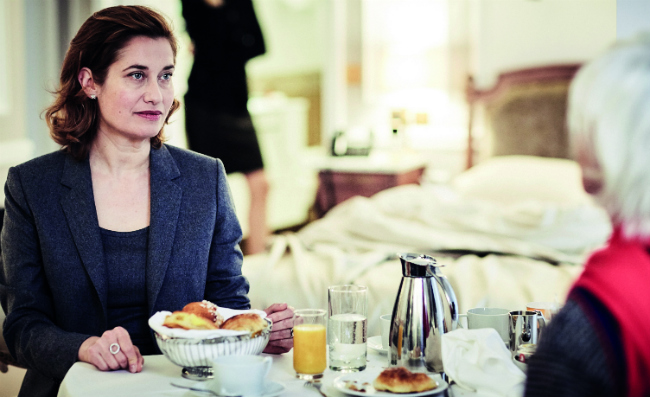
Emmanuelle Devos in “Number One.” Photo credit: Tabo Tabo Films
What prompted you to give up acting to write and direct instead?
I’ve always loved stories and that’s why I started my own production company. On set, I soon realised that I wouldn’t get the career I wanted. I wasn’t photogenic enough. I probably wasn’t patient enough. But I was really interested in the technical side, watching how lighting worked. Writing was complicated for me. It took some time to get there. But when I finally managed to finish my first screenplay I found a producer – I was lucky. I think my experience as an actress has helped me to write and direct. For me, actors are the essence of my work.
What do you look for in a project? Where do you find inspiration?
It depends. I’m currently working on two very different projects. One is fiction. I adopted two children so I’m doing a film on twins separated at birth and adopted who meet by chance at 45 years old. Can they be a family 45 years later? This reunion is told through the eyes of one of their children. It’s a film about childhood, and about women who didn’t have one. I think children can be marvellous adults and adults can be real children sometimes. I’m also going to make a utopian documentary asking the question: if capitalism had been invented by women what would it look like? I don’t have the answer but I have a few ideas. I doubt it would look like what we have today.
You’re the daughter of French actress Micheline Presle and American actor and director William Marshall. Has this multicultural background influenced your work?
I wasn’t raised by my father so when it comes to American culture, I’m self-taught. I’m half-American but only from a purely symbolic standpoint. But I have a very good knowledge of American cinema. I admire Americans’ taste for entertainment, even when they’re telling a very difficult story – that generosity to share with the spectator.
You seem to have a similarly entertaining, and optimistic, approach to filmmaking.
Always. I saw a Russian film called Loveless and it’s a beautiful film, but so dark and hopeless about everything: love, men and women, the country. I came out of there thinking: “What was that for?”. When I make a movie, if possible, I want the audience to feel better at the end. That’s what I do.
From France Today magazine
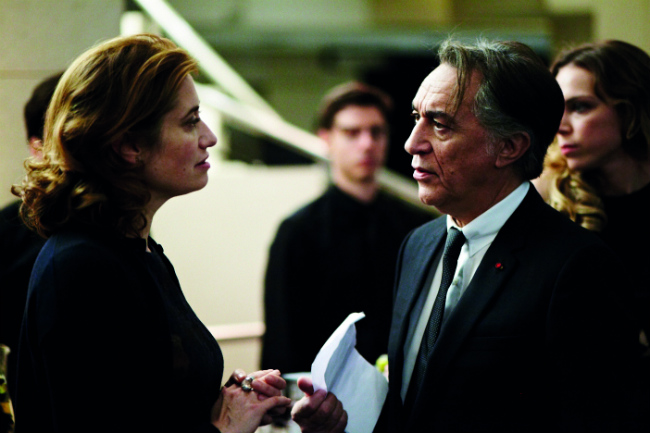
Emmanuelle Devos in “Number One.” Photo credit: Tabo Tabo Films
Share to: Facebook Twitter LinkedIn Email
Leave a reply
Your email address will not be published. Required fields are marked *

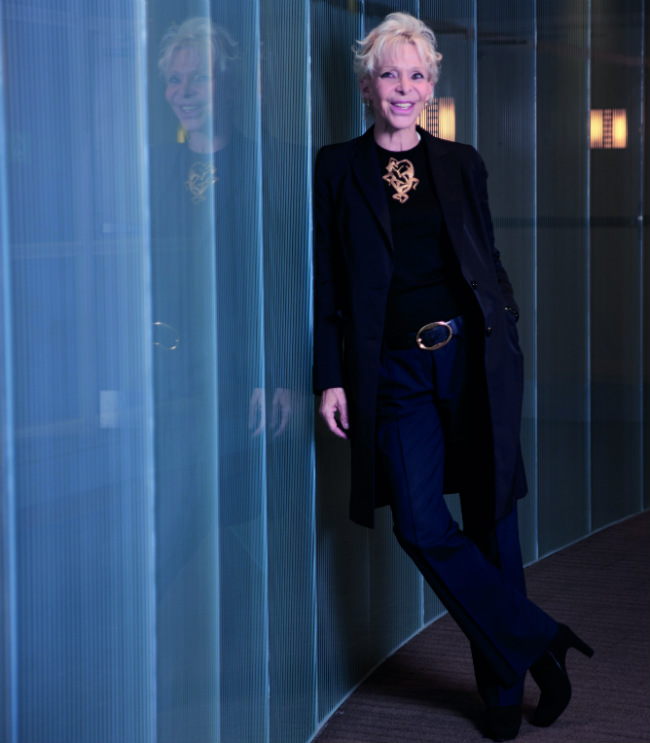




REPLY